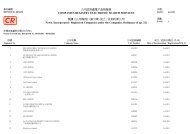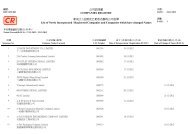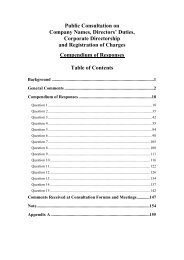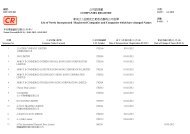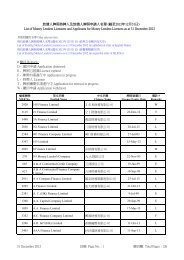Download - Companies Registry
Download - Companies Registry
Download - Companies Registry
Create successful ePaper yourself
Turn your PDF publications into a flip-book with our unique Google optimized e-Paper software.
V.<br />
Interesting incidents or issues relating to<br />
company incorporation over the years<br />
Registration of similar names<br />
number of of cases have concerned the<br />
A registration of similar names. In Computer<br />
Land Ltd v Registrar of <strong>Companies</strong> [1986] HKC<br />
49, Computer Land Ltd (Company A) was a<br />
company incorporated in Hong Kong in 1979,<br />
and Computerland Corp (Company B) was an<br />
American company incorporated in the US in<br />
the early 1970s and registered in Hong Kong<br />
as an oversea company under the <strong>Companies</strong><br />
Ordinance in 1980. Company B then applied<br />
for the reservation of company names<br />
“Computerland Corp of California (China) Ltd”<br />
and “Computerland Corp of America (China) Ltd”,<br />
and the Registrar reserved these two names.<br />
Company A contended that the reservation<br />
was improper, but the Registrar rejected the<br />
argument. In the judicial review commenced by<br />
Company A, the court held that the Registrar had<br />
fully borne in mind the provision of Section 20(1)<br />
(a) of the <strong>Companies</strong> Ordinance. There was no<br />
likelihood of deception between the applicant’s<br />
name and the proposed names sought to be<br />
reserved by Company A in view of all of the<br />
surrounding circumstances. The addition of<br />
“Corp” in “Computerland Corp of California (China)<br />
Limited” made it sufficiently distinctive from<br />
“Computer Land Limited”.<br />
In Land Power Intl Holdings Ltd v Inter-land<br />
Properties (HK) Ltd [1995] 2 HKC 146, the<br />
appellants were a major group of real estate<br />
companies whose Chinese names started with<br />
the words “Chi Yip [ 志 業 ]” International. The<br />
respondent company was also a real estate<br />
company named “Chi Yip [ 志 業 ]” Real Property<br />
HK Ltd. The appellants complained about the<br />
respondent’s use of “Chi Yip [ 志 業 ]” as the<br />
first two characters of its name, and applied<br />
for an interlocutory injunction to restrain the<br />
respondent from carrying on its business under<br />
that name. The appellants reckoned that the<br />
words “Chi Yip [ 志 業 ]” gave rise to the effect<br />
that the respondent was passing itself off<br />
as being connected or associated with the<br />
appellants. The issue was around whether the<br />
respondent had used the words “Chi Yip [ 志 業 ]”<br />
in such a way that would likely cause confusion<br />
and deceive the trade and the public into the<br />
belief that the respondent was a member of the<br />
appellants’ group.<br />
The court held that the characters “Chi Yip<br />
[ 志 業 ]” were descriptive words in common use,<br />
and that the respondent’s use of the further two<br />
characters “real property” could differentiate<br />
the two names sufficiently to avoid confusion.<br />
Furthermore, all of the appellants except one<br />
used the word “International” in conjunction<br />
with “Chi Yip [ 志 業 ]” as part of their trade<br />
names. The respondent, on the other hand,<br />
did not use “International” but “Real Property”<br />
with “Chi Yip [ 志 業 ]” as part of its trade name.<br />
Such distinguishing features made it impossible<br />
to hold that the respondent was passing off its<br />
business as that of any of the appellants.<br />
70 <strong>Companies</strong> <strong>Registry</strong>
Piercing the corporate veil<br />
number of cases involved the court<br />
A piercing the corporate veil, i.e. denying the<br />
shareholder the privilege of limited liability by<br />
treating the company and its shareholders as<br />
one (for example A-G v Chan Nai Keung, Daniel<br />
[1988] 1 HKLR 70, [1987] 2 HKC 41; China Ocean<br />
Shipping Co v Mitrans Shipping Co Ltd [1995] 3<br />
HKC 123; Good Profit Development Ltd v Leung<br />
Hoi [1993] 2 HKLR 176, [1992] 2 HKC 539;<br />
Concorde Construction Co Ltd v Colgan Co Ltd<br />
(No 2) [1984] HKC 253; Bakri Bunker Trading Co<br />
Ltd v Owners and persons interested in the ship<br />
“Neptune” [1986] HKLR 345; L Derochemont SA<br />
v Kent International Films Ltd [1987] 2 HKC 271;<br />
Good Profit Development Ltd v Leung Hoi [1993]<br />
2 HKLR 176, [1992] 2 HKC 539.<br />
Place of business<br />
here has also been an issue concerning<br />
T what constitutes a place of business<br />
for a company. In Elsinct (Asia Pacific) Ltd v<br />
Commercial Bank of Korea Ltd [1994],3 HKC<br />
365 a writ was served on the Commercial Bank<br />
of Korea (C Bank) at the office of its wholly<br />
owned subsidiary, which had a sign indicating<br />
that it was the representative office of the C<br />
Bank. C Bank argued that its activities there<br />
were of a non-business nature which included<br />
research, promotion and participation in<br />
meetings concerning international banking, and<br />
it had no bank account in Hong Kong, did not<br />
offer banking facilities in Hong Kong and did<br />
not pay tax in Hong Kong. It was held that C<br />
Bank’s activities there did not create any legal<br />
obligations between potential customers and<br />
the representative office, and that therefore<br />
the representative office was not a place of<br />
business, and so the service of writ there on C<br />
Bank was invalid.<br />
More recently, in Kam Kwan Sing v Kam Kwan<br />
Lai (2012) HCCW 154/2010, the court held that<br />
where the parent company was incorporated<br />
overseas, in order for it to establish a place of<br />
business in Hong Kong, it was not sufficient to<br />
hold shares in a company that ran a business in<br />
Hong Kong or to hold meetings in Hong Kong:<br />
evidence of concrete business activities carried<br />
out by the parent company at a particular<br />
location in Hong Kong was needed. It was not<br />
possible to treat the affairs of its subsidiaries as<br />
those of the parent company.<br />
Study Report on History of Company Incorporation in Hong Kong 71
V.<br />
Interesting incidents or issues relating to<br />
company incorporation over the years<br />
Company seal<br />
There was also an issue about the use of<br />
company seals. In On Hong Trading Co Ltd<br />
v Bank of Communications (2000) HCMP 3099<br />
of 1999, a mortgage was signed by the directors<br />
of a company, and sealed with a rubber chop. It<br />
was held that where a deed had to be executed<br />
by a Hong Kong company, it could only do so<br />
validly if it used its common seal, which by<br />
Section 93 of the <strong>Companies</strong> Ordinance had to be<br />
a metallic seal; a rubber stamp was not sufficient.<br />
(Note: To facilitate business operations, the keeping<br />
and use of a common seal becomes optional under<br />
the new <strong>Companies</strong> Ordinance scheduled to be<br />
implemented in the first quarter of 2014.)<br />
Validity of additional provisions in the articles of association<br />
In Lee Tak, Samuel v Chou Wen-hsien and<br />
others [1982] HKLR 350, the articles of<br />
association of a company contained inter<br />
alia an additional clause providing that the<br />
office of a director could be vacated in certain<br />
circumstances including “if he is requested in<br />
writing by all his co-directors to resign”. One of<br />
the directors received such a notice duly signed<br />
by all seven of his co-directors and in due course<br />
issued a writ against them and the company as<br />
the 8th defendant, seeking a declaration that<br />
the notice was null and void. It was held that<br />
apart from the required statements, a company<br />
may include in its articles any provision that it<br />
considered desirable for the regulation of its<br />
internal administration. Thus, the notice issued<br />
in pursuance of the additional clause was valid.<br />
72 <strong>Companies</strong> <strong>Registry</strong>
Mitigation of the ultra vires doctrine<br />
The company memorandum used to contain<br />
an objects clause. Under the doctrine of<br />
ultra vires, a company could not enter into<br />
activities that were beyond the objects clause.<br />
In order to mitigate the harshness of the ultra<br />
vires doctrine, drafters of company memoranda<br />
often used the following devices to ensure as<br />
broad and unfettered a corporate capacity as<br />
possible:<br />
ancillary to the company’s business which<br />
the directors from time to time thought<br />
advantageous (e.g. European Asian Bank v<br />
Reicar Investments Ltd [1988] 1 HKLR 45);<br />
(c) By listing what were essentially powers of<br />
a company (e.g. to grant pensions to former<br />
directors) as the company’s objects.<br />
(a) By listing a wide variety of objects (often<br />
extending for pages) with a concluding<br />
clause indicating that each clause was to<br />
be treated as a “separate and independent<br />
object” and not to be construed restrictively<br />
as ancillary to any other clauses (e.g. Pearl<br />
Island Hotel Ltd v Li Ka-yu et al [1988] 2<br />
HKLR 87);<br />
(b) By including a “subjective objects” clause<br />
which authorised the company or its<br />
directors to enter into any transactions<br />
However, the <strong>Companies</strong> (Amendment)<br />
Ordinance 1997 (Ordinance No. 3 of 1997)<br />
partially abolished the doctrine of ultra vires by<br />
providing that it was no longer compulsory for a<br />
company (other than a Section 21 company) to<br />
state its objects. Such a company may state its<br />
objects in its memorandum. It further provides<br />
that a company has the capacity and the rights,<br />
powers and privileges of a natural person.<br />
Thus, as long as the company does not state its<br />
objects, any transactions entered into by the<br />
company will not be ultra vires.<br />
Study Report on History of Company Incorporation in Hong Kong 73



